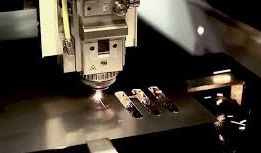

Inquiry

Project Review

Machining

Quality Control

Pass/Fail

Delivery
In the modern industrial landscape, durability and performance are critical factors that define the success of manufacturing and production processes. Sheet metal machining has emerged as a pivotal method to achieve high precision, durability, and optimal performance in industrial applications. This process involves cutting, shaping, and assembling metal sheets into functional components, offering significant advantages in various industries, including aerospace, automotive, construction, and electronics.

Enhanced Durability Through Sheet Metal Machining
Industrial applications demand materials that can withstand harsh conditions, including high temperatures, pressure, and corrosion. Sheet metal machining enhances durability in several ways:
Use of High-Quality Materials Sheet metal machining employs a variety of strong materials, including stainless steel, aluminum, titanium, and copper. These metals offer high resistance to corrosion, extreme temperatures, and mechanical stress, making them ideal for long-lasting industrial components.
Precision Manufacturing Advanced machining techniques such as CNC machining, laser cutting, and waterjet cutting enable manufacturers to achieve precise tolerances. This precision ensures that components fit together seamlessly, reducing weak points and enhancing overall durability.
Reinforced Structural Integrity The bending and welding processes used in sheet metal machining help reinforce structural integrity. Properly machined components have uniform thickness and smooth edges, preventing premature wear and tear.
Protective Coatings and Finishing Post-machining processes such as powder coating, anodizing, and galvanization provide an additional layer of protection against corrosion and environmental damage. These coatings enhance the longevity of machined components, making them more resilient in demanding environments.
Performance Advantages of Sheet Metal Machining
Beyond durability, sheet metal machining significantly improves performance in industrial applications. Some of the key performance benefits include:
Lightweight Design with High Strength Sheet metal components are designed to be lightweight without compromising strength. This is particularly beneficial in industries like aerospace and automotive, where reducing weight improves fuel efficiency and overall performance.
Customization and Flexibility With sheet metal machining, manufacturers can produce customized components tailored to specific industrial needs. Whether it’s a unique part for a specialized machine or a mass-produced component for assembly lines, the flexibility of sheet metal machining ensures optimal functionality.
Improved Heat Dissipation Many industrial applications involve high temperatures, making heat dissipation a crucial factor. Sheet metal machining enables the creation of designs that enhance airflow and heat management, thereby improving operational efficiency and preventing overheating-related failures.
Seamless Integration into Manufacturing Processes Machined sheet metal parts are designed for easy integration into existing manufacturing systems. Their compatibility with automation technologies and assembly lines reduces production downtime and enhances operational efficiency.
Reduced Maintenance and Replacement Costs Due to their durability and high-quality manufacturing standards, sheet metal machined components require minimal maintenance. This leads to lower long-term costs and reduced frequency of replacements, making them cost-effective for industrial applications.
Applications of Sheet Metal Machining in Key Industries
Aerospace Industry Aircraft structures, engine components, and control panels rely on sheet metal machining for precision and durability. The lightweight yet strong nature of machined sheet metal parts contributes to fuel efficiency and overall aircraft safety.
Automotive Industry Sheet metal machining plays a crucial role in manufacturing vehicle frames, exhaust systems, and engine components. These parts need to withstand high stress and environmental exposure, making durability a key factor.
Construction and Infrastructure Metal roofing, structural frameworks, and HVAC systems depend on sheet metal machining for reliable performance. The corrosion-resistant properties of machined sheet metal components ensure longevity in harsh weather conditions.
Electronics and Telecommunications Sheet metal machining is widely used in creating enclosures, brackets, and heat sinks for electronic devices. These components protect sensitive electronics from damage while ensuring efficient heat dissipation.
Future Trends in Sheet Metal Machining
The future of sheet metal machining is being shaped by technological advancements and industry demands. Some of the key trends include:
Automation and Robotics The integration of automation and robotics in sheet metal machining is improving precision, speed, and efficiency. Automated laser cutting and robotic welding are streamlining production while reducing labor costs.
3D Printing and Hybrid Manufacturing The rise of 3D printing technologies is complementing traditional sheet metal machining processes. Hybrid manufacturing, which combines additive and subtractive techniques, is creating new possibilities for complex component design.
Sustainability and Eco-Friendly Practices As industries focus on sustainability, manufacturers are adopting eco-friendly machining practices. Recycling metal waste and using energy-efficient machining techniques contribute to a greener manufacturing environment.
Advanced Materials Research into new materials, such as carbon-fiber-reinforced metals and ultra-lightweight alloys, is expanding the capabilities of sheet metal machining. These materials offer even greater strength-to-weight ratios and enhanced durability.
Sheet metal machining is a critical process that enhances durability and performance in industrial applications. By utilizing high-quality materials, precision techniques, and protective coatings, sheet metal machining ensures that industrial components can withstand harsh conditions while maintaining optimal performance. Its applications across various industries, from aerospace to construction, highlight its versatility and reliability. As technology continues to evolve, the future of sheet metal machining looks promising, with advancements in automation, sustainability, and material innovation paving the way for even greater efficiency and durability in industrial manufacturing.
About AJL Machining:
AJL Machining is a professional and industry-leading one-stop workshop for custom metal parts services. We have our own factory and a reliable network of partners that enable us to cater to your requirements ranging from prototypes to large-scale production. Our competitive edge is our ability to ensure that all of your parts are produced according to specifications, within budget, and delivered on time to meet your evolving demands. Presently, we serve over 80% of our business to multinational corporations in China, as well as overseas customers.
To learn more, please don't hesitate to contact us via email at sales@ajlmachining.com, or visit our website at www.ajlmachining.com

AJL Machining is a professional and industry-leading one-stop shop for custom metal parts services. We have our own factory and a reliable network of partners that enable us to cater to your requirements ranging from prototypes to large-scale production.
Add: No 58, Chenghu Road, Kunshan, Suzhou City, Jiangsu Province, China 215333
Email:sales@ajlmachining.com
Tel: +8613522650203